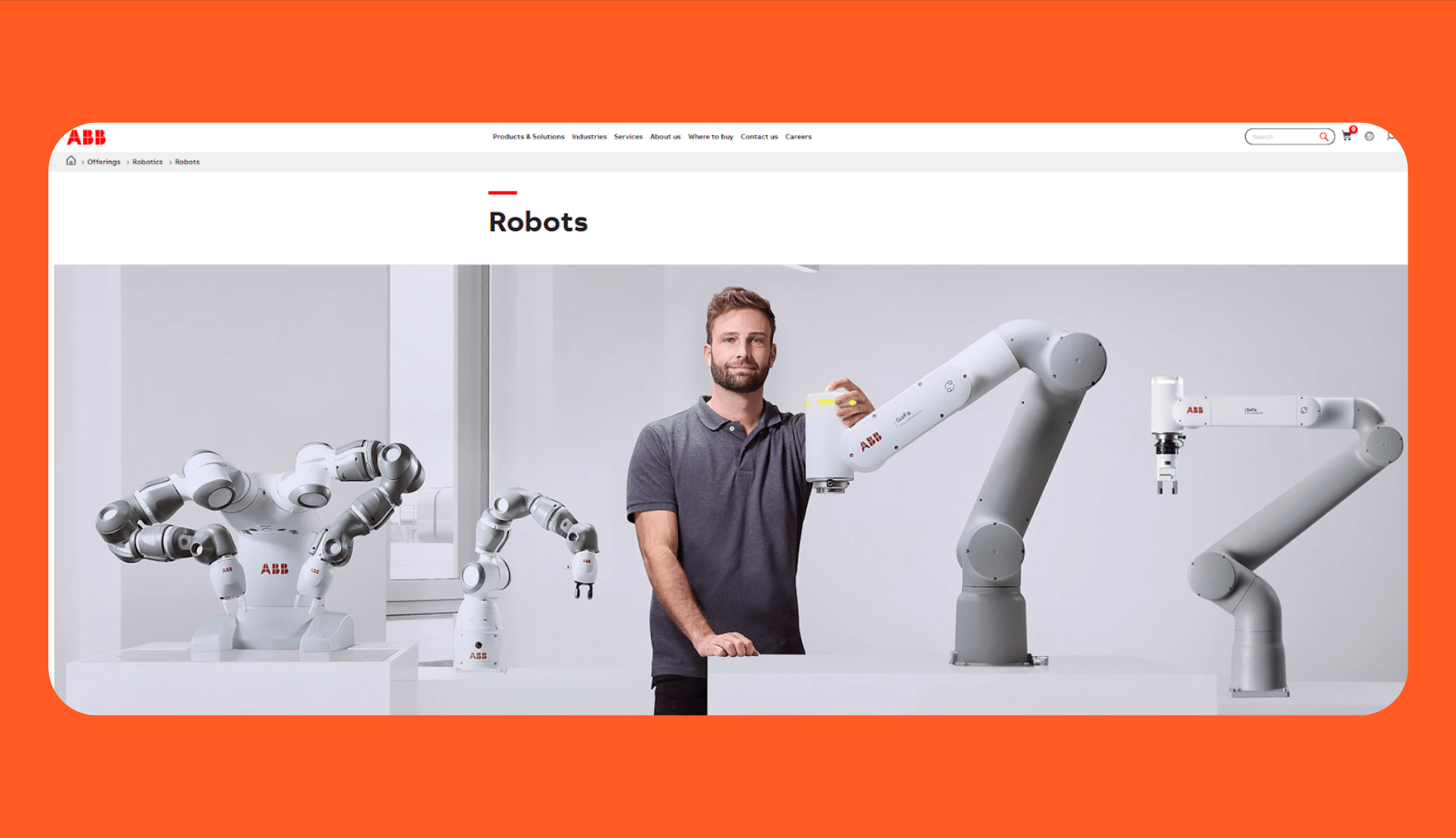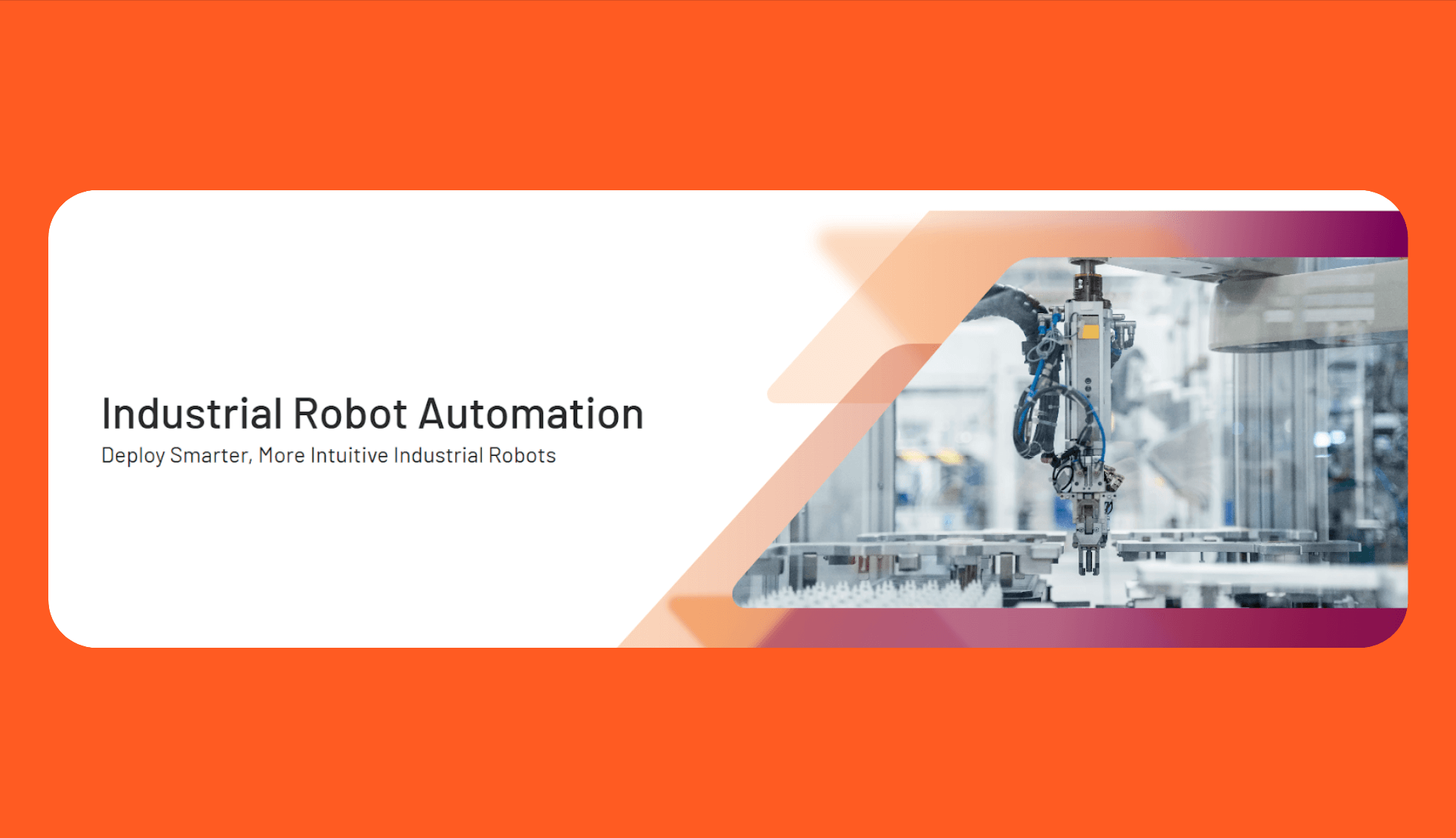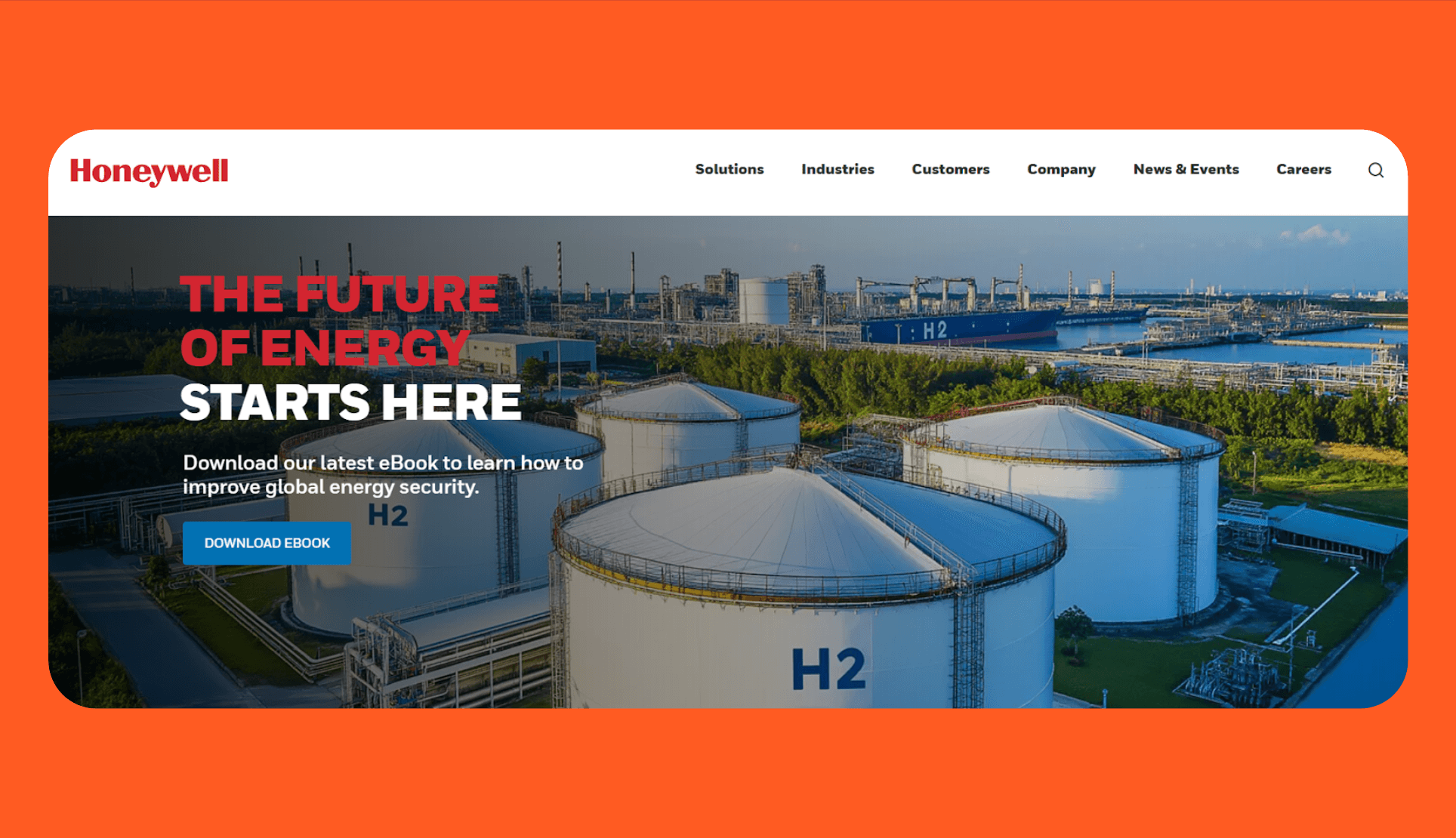Industrial automation companies are building the future of manufacturing, and it's nothing like your 1980s assembly line.
Today's leaders are selling robots, and they're solving the 2.1 million worker shortage crisis hitting U.S. factories while the global industrial automation market races toward $395 billion by 2029.
The top automation companies winning in 2025? They're the ones whose robots actually work out of the box, whose software doesn't need a PhD to operate, and whose systems make factories run like clockwork without the Swiss watch price tag.
Best industrial automation companies in 2025: TL;DR
Who are the top industrial automation companies?
The top industrial automation companies include global leaders such as Siemens, Standard Bots, ABB, Rockwell Automation, Schneider Electric, and Honeywell, alongside companies like Emerson, Mitsubishi Electric, and FANUC.
These companies provide a wide range of automation and control solutions, from industrial software and robotics to process control systems, serving diverse sectors like manufacturing, energy, and pharmaceuticals.
And here are three factors that separate the leaders from the alternatives:
- Scale and reach: The ability to deploy solutions globally while maintaining local support
- Innovation velocity: How fast they're integrating AI, machine learning, and edge computing into actual products
- Real-world impact: Whether their tech actually makes operations better or just looks good at expos
Top 10 industrial automation companies in 2025
1. Standard Bots

Standard Bots raised $63 million in Series B funding led by General Catalyst to accelerate AI development and expand U.S. manufacturing. RO1 ships in four weeks from Standard Bots’ Glen Cove, New York facility.
Unlike traditional industrial robots that need specialized programmers and weeks of integration, RO1 uses no-code programming. This makes it easy for you to learn its operations in a few hours. It even features built-in 3D vision, AI capabilities comparable to GPT-4, and smooth integration with OnRobot grippers.
Before you commit, Standard Bots will give you an on-site demo with one of our engineers. This means manufacturers can test the system in real production before buying.
Strengths: U.S.-designed and assembled, built-in 3D vision, no recurring license fees
Flagship product: RO1 cobot with 18 kg payload, ±0.025 mm repeatability, AI-powered automation
Who should consider Standard Bots? Machine shops that need CNC tending, manufacturers wanting accessible automation without complex integration.
2. Siemens

Siemens employs over 300,000 people globally and operates in 190 countries, making it one of the largest industrial automation companies worldwide.
At the heart of this is Xcelerator, Siemens’ open digital platform that blends software, hardware, and services into one ecosystem. By partnering with dozens of other tech providers, Siemens has turned Xcelerator into a collaborative hub for industrial innovation.
Siemens also tests its own solutions at scale, running them across more than 270 of its factories worldwide. This “prove it in production” approach gives customers confidence that the tools will work in real-world conditions. With a history stretching back more than a century, Siemens has shifted from its telegraph roots to a leader in digitalized manufacturing.
Strengths: End-to-end digitalization pioneer, proven enterprise solutions, largest automation software portfolio
Flagship product: SIMATIC automation systems integrated with the Xcelerator digital twin platform
Who should consider Siemens? Large enterprises pursuing digital transformation, and companies that need proven enterprise-scale solutions.
3. ABB

ABB has installed 500,000 robots globally, making it a leading robotics supplier. The company’s OmniCore system runs everything from motion to sensors under a single architecture, which means faster cycles and lower energy use for manufacturers.
ABB holds the number one robotics position in China, investing $150 million in a new Shanghai factory. Its portfolio spans from YuMi collaborative robots for electronics to IRB 8700 robots handling 800 kg payloads.
ABB also invests heavily in digital platforms. Through its Ability suite, customers can connect equipment, monitor performance in real time, and cut downtime across production lines. With deep roots in automotive and growing influence in food, electronics, and logistics, ABB remains a top partner for manufacturers moving toward smarter automation.
Strengths: Motion control excellence, China market leader, extensive portfolio from cobots to heavy industrial
Flagship product: OmniCore platform with 1,000+ hardware and software features
Who should consider ABB? Automotive manufacturers, electronics assembly, and high-speed production lines.
4. Rockwell Automation

Rockwell Automation is the leading factory automation provider in North America, with deep roots in programmable logic controllers (PLCs) and control systems. The company focuses on helping manufacturers digitize operations through scalable hardware and software solutions.
Its flagship FactoryTalk® platform integrates industrial control with analytics, cloud connectivity, and AI. Combined with Rockwell’s Logix controllers and automation hardware, this ecosystem allows customers to manage entire production lines from a unified system.
Rockwell serves industries ranging from automotive and life sciences to food and beverage. Its strength lies in combining decades of industrial expertise with modern digital capabilities, making it the go-to partner for U.S. manufacturers advancing toward smart factories.
Strengths: PLC and control leadership, strong North American presence, deep vertical expertise
Flagship product: FactoryTalk digital automation platform with Logix control systems
Who should consider Rockwell Automation? Manufacturers in North America looking for proven control systems and end-to-end automation integration.
5. Emerson Electric

Emerson Electric is a global leader in process automation, best known for serving industries like oil and gas, chemicals, power, and water treatment. The company specializes in technologies that optimize continuous production environments where uptime and reliability are critical.
Its DeltaV™ distributed control system and Plantweb™ digital ecosystem connect sensors, controllers, and analytics tools into a unified network. This gives operators real-time visibility into plant performance and supports predictive maintenance strategies that cut downtime and improve safety.
Emerson combines its process expertise with digital transformation initiatives, helping customers balance efficiency, compliance, and sustainability goals. With a strong footprint in critical infrastructure, Emerson is often the first choice for process-heavy industries upgrading legacy systems.
Strengths: Process automation expertise, strong presence in energy and infrastructure, predictive analytics focus
Flagship product: DeltaV distributed control system integrated with Plantweb digital ecosystem
Who should consider Emerson Electric? Process industries, like oil and gas, chemicals, and utilities, that need reliable, scalable control solutions.
6. Mitsubishi Electric

Mitsubishi Electric excels in precision factory automation, especially across Asia and Europe. The company combines robotics, motion control, and electrical systems into one of the broadest automation portfolios in the market.
Its MELFA industrial robots and MELSEC PLCs are widely adopted in electronics and automotive manufacturing, known for accuracy and long-term reliability. Mitsubishi also pushes heavily into smart manufacturing, with its e-F@ctory platform helping plants integrate robotics, sensors, and IT systems.
According to the International Federation of Robotics, as of 2022, Japan remains the world’s largest industrial robot manufacturer, producing 45% of the global supply, a position Mitsubishi helps reinforce through its robotics exports and technology leadership. With decades of experience, it delivers precision automation trusted worldwide.
Strengths: Japanese engineering reliability, strong robotics and motion control, e-F@ctory digitalization platform
Flagship product: MELFA robots and MELSEC PLCs integrated with e-F@ctory
Who should consider Mitsubishi Electric? Electronics and automotive manufacturers seeking precision, reliability, and global support.
7. Schneider Electric

Schneider Electric stands out for merging energy management and industrial automation, giving manufacturers tools to cut costs and meet sustainability goals. Its focus is not only on factory efficiency, but also on reducing energy use and carbon emissions.
The company’s EcoStruxure platform connects automation systems with energy monitoring, enabling plants to optimize both production and power consumption in real time. This convergence makes Schneider especially relevant as industries face rising energy costs and stricter environmental regulations.
Schneider supports customers across sectors from pharmaceuticals to heavy industry. By combining decades of electrical engineering expertise with digital automation, it has become a trusted partner for manufacturers seeking smarter, greener operations.
Strengths: Energy + automation convergence, sustainability leadership, global service network
Flagship product: The EcoStruxure platform, integrating automation and energy management
Who should consider Schneider Electric? Manufacturers focused on efficiency, sustainability, and energy optimization.
8. Yokogawa Electric

Yokogawa Electric is a long-standing specialist in process control and instrumentation, with a strong reputation in industries like oil and gas, petrochemicals, and power generation. The company focuses on stability and accuracy in continuous production environments, where errors can be costly.
Its flagship CENTUM distributed control system is one of the most widely adopted DCS solutions worldwide, known for reliability in complex plants that run around the clock. Yokogawa also develops advanced process analyzers, field instruments, and control software that integrate into its automation ecosystem.
With over a century of engineering history, Yokogawa combines traditional process expertise with modern digital tools. Its approach is steady and conservative, making it a preferred partner for companies that prioritize safety, uptime, and long lifecycle support over rapid change.
Strengths: Process control expertise, proven reliability, strong presence in oil and gas
Flagship product: CENTUM distributed control system
Who should consider Yokogawa Electric? Process-heavy industries that need high reliability and long-term support.
9. Honeywell International

Honeywell International is a global leader in industrial software and control systems, combining hardware expertise with advanced digital platforms. Its automation technologies are used across aerospace, chemicals, energy, and building systems, giving it one of the broadest industry footprints.
The company’s Experion Process Knowledge System (PKS) integrates process control with real-time data, analytics, and safety features. Honeywell also invests heavily in industrial cybersecurity and advanced software, making it a strong choice for companies modernizing complex facilities.
With decades of experience and a focus on integrating automation with enterprise software, Honeywell delivers both reliability and digital innovation. Its solutions help manufacturers reduce downtime, improve compliance, and transition toward smarter, more connected plants.
Strengths: Industrial software leadership, strong cybersecurity focus, wide industry reach
Flagship product: Experion PKS control and monitoring system
Who should consider Honeywell International? Enterprises seeking integrated control systems with advanced software and security features.
10. FANUC

FANUC is one of the world’s largest suppliers of industrial robots and CNC automation systems, with millions of installations across factories worldwide. Based in Japan, the company is recognized for its scale, reliability, and focus on high-volume production environments.
The FANUC ROBOT series includes a wide range of robotic arms for assembly, welding, painting, and packaging, while its CNC systems remain the backbone of machining worldwide. FANUC also integrates AI-powered predictive maintenance through its FIELD system, giving manufacturers visibility into robot health and production performance.
FANUC is especially strong in automotive and electronics, where uptime and consistency are critical. With decades of engineering refinement and one of the largest service networks globally, it continues to set the benchmark for robot reliability and CNC precision.
Strengths: Global scale, unmatched reliability, CNC and robotics leadership
Flagship product: FANUC ROBOT series with FIELD system integration
Who should consider FANUC? Automotive, electronics, and large-scale manufacturers needing proven, high-volume automation.
Why does choosing the right automation partner matter?
The automation partner you choose directly determines how successful your investment will be. The right vendor is not only a supplier of hardware but also a provider of reliable support, transparent pricing, and scalable technology.
Flexible models such as cobot leasing or subscription packages reduce the burden of upfront capital while still giving manufacturers the ability to meet production goals.
The partner you select shapes ROI in four ways:
- Uptime and support: Fast service response prevents hours of lost production. Even a short outage can cost thousands, which means reliable assistance is critical.
- Scalability: The best systems grow with you. Start with one robot, expand to a full cell without rebuilding your workflow or retraining staff.
- Cost structure: Beyond purchase price, integration, training, and hidden licensing fees can erode budgets. Vendors that keep costs predictable ensure automation stays sustainable.
- Return on investment: Proven platforms with industry adoption deliver faster payback and long-term stability, avoiding the risk of untested technologies.
So, choosing the right automation partner is not just a one-time decision. It defines efficiency, profitability, and competitiveness for years to come.
Next steps with Standard Bots’ robotic solutions
Looking to upgrade your automation game? Standard Bots’ RO1 is the perfect six-axis cobot addition to any CNC setup, delivering unbeatable precision and flexibility.
- Affordable and adaptable: RO1 costs $37K (list price). Get high-precision automation at half the cost of traditional robots.
- Precision and power: With a repeatability of ±0.025 mm and an 18 kg payload, RO1 handles even the most demanding CNC jobs.
- AI-driven simplicity: Equipped with AI capabilities on par with GPT-4, RO1 integrates seamlessly with CNC systems for advanced automation.
- Safety-first design: Machine vision and collision detection mean RO1 works safely alongside human operators.
Schedule your on-site demo with our engineers today and see how RO1 can bring AI-powered greatness to your shop floor.
FAQs
1. Which is the largest industrial automation company?
The largest industrial automation company by revenue is Siemens AG, reporting approximately €75.9 billion in sales during 2024 and employing around 327,000 people across 190 countries. Siemens leads in industrial automation and software, outpacing competitors like ABB, Rockwell Automation, and FANUC.
2. What’s the difference between industrial and factory automation companies?
The difference between industrial and factory automation companies is scope. Factory automation focuses specifically on production lines, robots, PLCs, and assembly systems. Industrial automation companies cover a broader range, including process industries like oil, gas, and utilities. While all factory automation is a type of industrial automation, not all industrial automation is specifically focused on factories.
3. How do I choose the right automation company for my business?
To choose the right automation company, evaluate your industry needs, budget, and scalability goals. Look for proven expertise in your sector, such as process control for energy or robotics for automotive. Verify reliable support, ease of integration, and realistic ROI timelines.
4. Are there affordable automation options for small manufacturers?
Affordable automation options for small manufacturers do exist. Cobots like Standard Bots’ RO1 or Universal Robots’ UR series cost $25,000 to $50,000 and ship ready-to-use. The no-code programming system reduces upfront investment and training costs. These options allow small shops to automate CNC tending, palletizing, or assembly without major capital expense.
Join thousands of creators
receiving our weekly articles.










.png)

